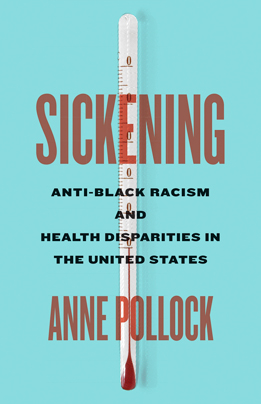c.2021, University of Minnesota Press
$21.95 / higher in Canada
203 pages
By Terri Schlichenmeyer
The Truth Contributor
Something inside isn’t working quite right.
Your stomach hurts, your lungs are on fire, you gurgle where you shouldn’t, and there’s a sharp pain where there wasn’t one yesterday. You’ve tried every home remedy there is, but something inside you isn’t right. So, as in the new book Sickening by Anne Pollock, will the inside of you be treated based on the color of your outside?
On October 21, 2001, Washington D.C. postal workers Thomas Morris and Joseph Curseen died from inhaled anthrax, a poison which authorities presumed had leaked from a package that was sent to a member of the Senate. Morris’ and Curseen’s co-workers believed that their workplace, which was staffed mostly by Black employees at that time, was contaminated in several places – and yet, despite the danger, “postal workers were repeatedly told that there was nothing to worry about.”
Before they died, both men sought medical help, but their concerns were dismissed.
Perhaps because of the proximity to 9/11, most white Americans were unaware of this incident, says Pollock. She sees this as a starting point for discussion about health disparities for Black Americans in modern times.
Not quite four years after Morris and Curseen died, Hurricane Katrina hit the southern coast of Louisiana, where “the impacts of the storm were most heavily borne by… residents who were Black and poor.” This includes those who lost access to or were denied medication, as well as those who were forced to shelter in unsanitary or overcrowded conditions.
Being imprisoned is notoriously bad for one’s health, but release, says Pollock, can likewise be detrimental to one’s well-being. You only need look as far as Flint, Michigan, to see what happens when a utility fails in a largely Black community. Just trying to live in America can come with violence, if you’re young and Black; or injustice if you’re pregnant and Black. You can do what you can do to stay healthy but, as Pollock quotes a British journal, “being poor in America, and especially being poor and Black… is still hazardous to your health.”
There’s no doubt about it: Sickening is sobering.
It’s made even more so by the fact that author Anne Pollock is a professor of global health and social medicine in London, which widens the focus of everything she presents here.
Under that microscope is not a good place for America to be.
And yet, despite that the anecdotal evidence Pollock uses to prove health disparity for Blacks in the U.S. is shocking, it also feels like surface-skimming. These tales are nothing new – not news-wise, and certainly not to Black readers – but their presence in this thin, important book may leave the small, sometimes more impactful, tales to go untold. Readers deserve those tales, too; fortunately, Pollock’s “template for analysis” can help with deeper digging, and further learning.
Policy makers would be well-served to read this book, as would students and activists who want a launching-off point. Sickening is a good, if not quite thorough, start; all you have to do is look inside…

